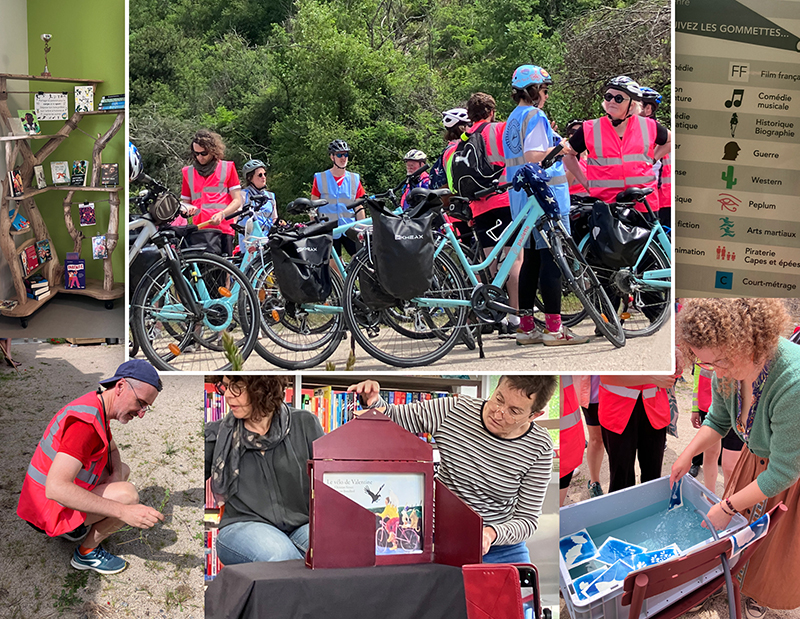When 50 Librarians Biked Across France | Reasons to Love Libraries
A “rolling unconference” provides time for librarians from around the world to exchange ideas, share challenges and successes, and take in local libraries—all while pedaling through changing landscapes.

Cyclo-biblio—a library-to-library bike tour designed by and for librarians—first came on my radar 10 years ago when I was working at a safe streets organization, charting connections between bikes and books for a presentation at the National Bike Summit. I’m now a school librarian, and I joined the tour this year to expand my horizons and library learning while flexing my calf muscles and rusty French language skills.
Today, Cyclo-biblio is a volunteer-led nonprofit with an organizational team of librarians scattered across France from the Loire Valley to the southern part of the country. The goal? A rolling unconference providing exposure to multiple libraries, where librarians of all stripes exchange ideas, trade information, and share challenges and successes—all while pedaling through changing landscapes.
Also Read: Can’t Shush This | Reasons to Love Libraries
The 2024 ride included 50 cyclists and 19 library visits over five days. The group included veteran and novice cyclists, electric bikes and “mechanical” ones, and cyclothécaires (bike-brarians) ages 23 to 73. The librarians came from universities and public libraries, national libraries and regional advisory groups; from Denmark, Sweden, Latvia, Belgium, and France. I was the only U.S. rider and one of two school librarians; the other was from Olaine, a town of 10,000 in central Latvia. Leaders in light blue safety vests had plotted the route, ridden it, and made contact with host libraries and lodgings in advance.
Our trajectory began in Lyon and ended 385 kilometers (239 miles) later in Avignon. On the first day, we took a break to don rain gear; the next, to smother ourselves in sunscreen. We traveled mostly on the ViaRhôna, a bike and pedestrian path hugging the Rhône River.
At the Médiathèque de Portes-lès-Valence, a Cyclo-biblio organizer spoke of libraries as shelters of democracy and learning, invoking the history of the Resistance in the area, and the desire to have children continue their studies during the Second World War. Inside, children’s librarians performed the story of Valentine, a girl riding a bicycle who couldn’t resist letting her animal friends hop onto her two-wheeler. The story, told through Kamishibai story cards—illustrations on standard-sized loose-leaf paper—involved three librarians: one telling the story, another singing a contagious refrain, and the third equipped with finger puppets depicting the animals as they alighted on the handlebars, fenders, and crossbar.
It turns out that the French word for weeding books is the same as the English. One library, Etoile, invited us to literally pull unwanted green sprigs from the ground and also to participate in a cyanotype workshop. We used treated paper and plants to make sun prints on paper, an activity generally offered to groups of young people. A regional library center offered a stationary bike with a built-in shelf for a book, a display of covers of old-time picture books, and a meter-high wooden Connect Four game.
We were drenched as we pedaled into the town of Roussillon in southeastern France. It boasted a two-story library with a bevy of edible delights, a warm welcome by the town’s mayor, and a history with modern-day implications. An edict delivered there in 1564 standardized the first day of the new year as January 1. When we were called downstairs for a “surprise,” actors in Renaissance period costumes recited soliloquies as French poet Louise Labé and ladies-in-waiting to Catherine de’ Medici.
At the Médiathèque F. Mitterrand, a public library and media center in Latour-Maubourg in the city of Valence, we descended into the archives to explore original accounting books from the 1300s and other treasures. After closing time, we were allowed to roam free.
Truth be told, our group used a truck—the biggest source of carbon emissions, aside from my flight—for baggage transport, sag wagon, and coffee cart. As our voyage ended, we rode across a modern bridge into an ancient walled city for a final festive meal. On our last night together, we celebrated the obstacles that had strengthened our bond and announced our resolve to keep going—and to meet again the next summer.
 Laura Silver is a librarian at New Utrecht High School in Brooklyn, NY.
Laura Silver is a librarian at New Utrecht High School in Brooklyn, NY.
RELATED
The job outlook in 2030: Librarians will be in demand
The job outlook in 2030: Librarians will be in demand
ALREADY A SUBSCRIBER? LOG IN
We are currently offering this content for free. Sign up now to activate your personal profile, where you can save articles for future viewing






Add Comment :-
Be the first reader to comment.
Comment Policy:
Comment should not be empty !!!